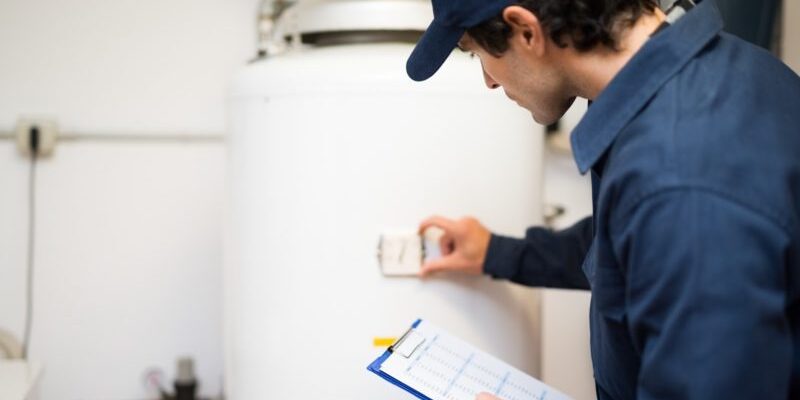
How to Act When Your Water Heater is Leaking
In case you’ve experienced the awful situation of passing by your utility closet and feeling your feet getting wet, possibilities are that you’re going to handle a leaking water heater.
Just like any leaking appliances or fixtures in your house, you must respond quickly to fix the problem. Read on to know what you need to do to lessen damage and handle your leaking water heater.
1. Shut off the Water & Power or Gas Supply
If you doubt that your water heater is leaking, the first step you need to do is turn off your water and power supply.
These things will lessen the odds of more flooding and water damage, but the most important thing that there will be less possibility that the water will cause any damage to other fixtures in its vicinity.
turning off the water supply to your water heater is the fastest way to make the leak slow. It can be done immediately with the cold-water turn-off valve or by shutting water supply to the whole house.
If you could touch the cold water shut-off without stepping on the water, use the cold-water supply valve to stop your heater’s water supply.
The valve looks like a wheel or a handle. If your valve looks like a wheel, turn clockwise to shut it off. If it is a handle, rotate it 180 degrees.
Serios leak
But, if your leak is serious, or you can’t reach the valve, you should shut off your house’s main water supply.
If you aren’t certain where your main water valve is, contact a professional immediately.
If you’ve stopped water supply into your unit, you’ll need to shut off the unit’s power or gas. In case you have an electric water heater, flip off the breaker before anything else. If you have a gas water heater, turn off the gas valve.
When the water has stopped getting into the water heater, and its power has been turned off, you’re ready to safely and thoroughly inspect the problem.
2. See Where the Leak is Coming From

Before connecting with a pro, you’ll need to be sure about where your water heater is leaking. Wetness can be a result of a leaky roof or even condensation.
check the place around your water heater carefully to determine where specifically the source of water is.
If you can’t be certain of the source, it’s all right, a professional will be able to identify the problem area and figure out the suitable solution.
3. Troubleshoot & Call a Pro



The moment you’re certain that it’s your water heater is leaking, now is the time to do some troubleshooting.
Any piece of information you can collect about the source of your problem will make the fixing process automatically easier. Here are the most common problems that can make your water heater leak.
Cold Water Inlet & Hot Water Outlet
If you’re fortunate, the issue will be nothing more than loose inlet or output pipes. These pipes are responsible for letting cool water into the heater and moving warm water all-around your house.
If you see a leak at these connection points, you can just tighten the valves using a wrench.
Loose Drain Valve
If you think that the leaking is located at the bottom of the tank, it could be made of a loose drain valve. The drain valve must be entirely closed with no evidence on moisture near it.
In case it was leaking, it’s likely because of a loose washer inside. Although you may need the intervention of a pro to replace this piece, it should be a rather quick repair.
Too Much Pressure
Every water heater is equipped with a temperature and pressure relief valve (T/P valve). This valve (and the attached pipe) will be installed on either the top or side of the pipe.
What to do?
The T/P valve controls both internal water temperature and water pressure. When there’s a lot of pressure in the tank, it will immediately get rid of water to minimize pressure and stop the tank from exploding.
Examine the spot where the valve connects with the tank and make sure it’s not leaking.
If you noticed that there isn’t a sign of a leak, check if the valve is in the open or closed position. If it’s closed and you see the water is still circulating in the attached pipe, the valve may need to be replaced.
On the contrary, if the valve is open and your heater is set within a normal temperature range (120 to 140 degrees Fahrenheit), it might be releasing too much pressure from the tank.
In both situations, you need to call a pro to fix the problem.
Cracked Storage Tank
Unluckily, one of the most common reasons for water heater leaks is a crack in the inner storage tank. In this case, water will be coming from the bottom of the heater.
The sad news is that you will have to purchase a new unit if your inner tank is cracked. The good news is that this is often a result of wear and tear over the years, so it’s possible that your heater needed an update anyway.
A leak can be serious, because a tiny amount of moisture in the home can cause rot, mold, and electrical damage.
If you have doubts that your unit is damaged, act fast. With the help of a specialist, the problem will be fixed in no time and with the least damage to other places in your house.

